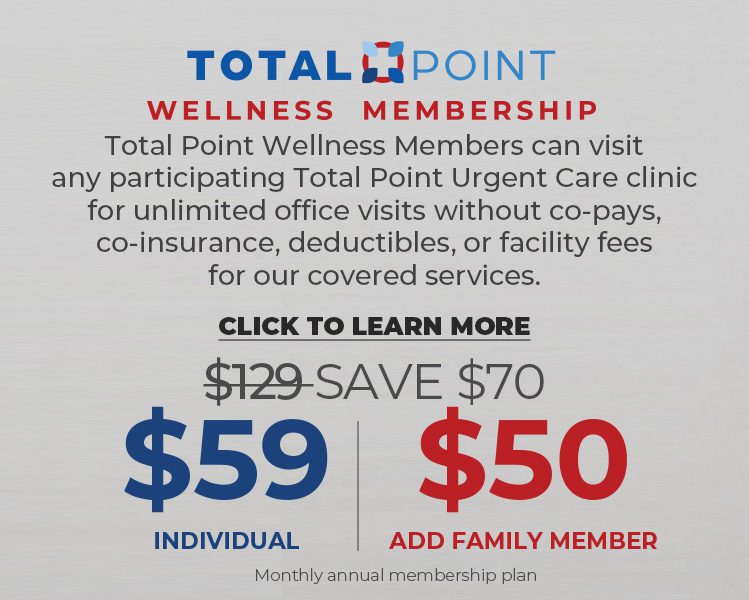Has it been a while since you saw your primary care physician? If you’re like a lot of people, you probably haven’t sought much health care since the pandemic started. Many doctors’ offices have been over-booked, and people are reluctant to seek treatment when it could mean COVID-19 exposure. Just because you’re not getting health checkups as much as you normally would, though, that doesn’t mean your healthcare needs to be put on hold. Here are some ways you can perform some health checks at home.
- Review your routines. Are you sleeping enough? Getting regular exercise? How’s your diet? Your routines and habits are the foundations of your health, so make sure they’re building toward a healthy life.
- Track your vitals. Blood pressure, heart rate, respiration rate, and blood oxygen level are important things to know, so it’s smart to learn to monitor them yourself. If this feels overwhelming, make a quick stop by urgent care and have them checked. Another vital sign to check is your temperature. This varies between people, and normal can run anywhere from 95° to 101°. Taking your temperature when you’re healthy can help you determine what’s normal for you so that you’ll know when your temperature is a cause for concern.
- Measure your waist. Did you know that your waist circumference can be an indicator of your risk of certain health conditions? The thicker your waist, the higher your risk of type 2 diabetes, high blood pressure, high cholesterol, and heart disease. Measure your waist with a soft tape measure, at the level of your belly button. For men, the number should be under 40 inches, while for women, under 35 is healthier.
- Examine your skin. Early treatment offers the best outcomes for skin cancer, so regularly checking your skin at home is a must. Look for moles with the ABCDE warning signs: Asymmetrical, Borders that are irregular, Color that’s abnormal, Diameter larger than a pencil eraser, and E for evolving, or changing over time.
- Check your breasts. Similarly, breast cancer is most successfully treated when caught early. Breast self-awareness is key here, because if you know how your breasts normally look and feel, you’ll be better able to notice when something is not right. Additionally, have a breast exam at your gynecologist appointment, annually.
- Assess your sleep. If you wake up every day exhausted, you may have a sleep disorder. Have your bedmate pay attention to the way you snore, and if it’s loud, broken up with pauses, or includes gasping, moaning, or mumbling, you may have sleep apnea. Other sleep apnea signs to notice: falling asleep unintentionally, feeling exhausted when you’ve had a full night to sleep, waking up with a dry throat or headache, or being irritable and unable to concentrate during the day.
- Be aware of body hair. An increase in body hair could indicate an underlying health problem. If you’re concerned, ask your doctor to run some tests. The right bloodwork can determine whether your uptick in hair growth indicates a problem like PCOS (polycystic ovarian syndrome), thyroid trouble, or tumors on the ovaries or adrenal glands.
- Prioritize your mental health. Many people need a little extra help these days, given the state of the world. Don’t hesitate to seek mental health treatment if you’re feeling down or even just a little “off.”
- Don’t neglect an injury. Maybe you strained your back lifting something or pulled a muscle working out. Don’t just let it keep hurting! Visit a doctor, whether your usual doctor or an urgent care clinic, to make sure it’s nothing serious.
Healthcare is an important part of self-care, and if you can’t get in to see your usual physician, Total Point Urgent Care can step up and fill the gap. The goal of Total Point Urgent Care is to be a convenient healthcare resource for our community. Providing immediate medical care at a fraction of the cost of an emergency room, our neighborhood urgent care clinics offer warm, efficient, personalized care. At our locations in Texas, our on-site technology and services include urgent care, primary care, specialty care, routine checkups, flu shots and other vaccinations, COVID-19 testing, and onsite lab and x rays. We take urgent care walk-ins and soon, we’ll even offer virtual visits so that our patients can choose telecare instead of risking a trip to the clinic. For convenient medical care, visit one of our locations or contact us through our website.





